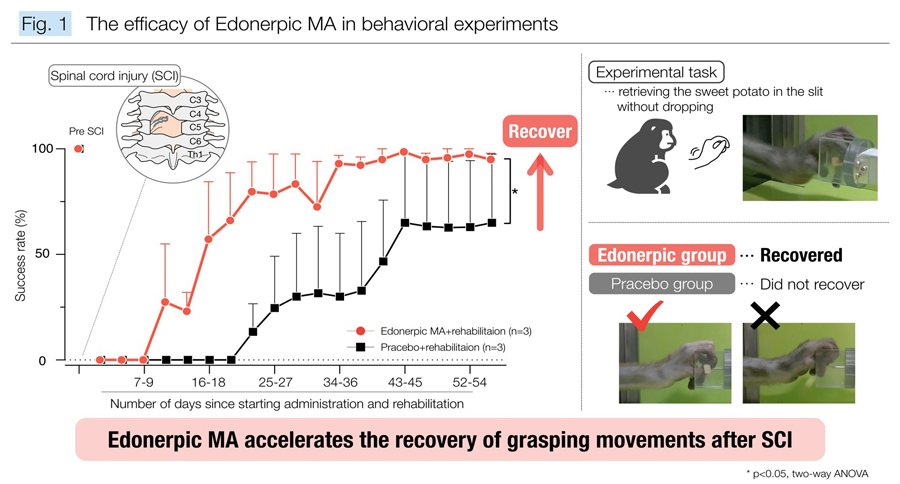Improving Rehabilitation after Spinal Cord Injury Using a Small Compound Oral Drug
2025.03.13
Researcher(s): Takuya Takahashi, Abe Hiroki, Nakajima Waki,Ota Wataru
Researchers discover that edonerpic maleate accelerates motor recovery and facilitates brain plasticity in non-human primates with spinal cord injury
Spinal cord injury (SCI) resulting in severe paralysis is known to deteriorate the quality of life of humans. However, the treatment strategies for recovery of motor function after SCI are limited. Now, researchers from Japan have identified a small compound, edonerpic maleate, which accelerates recovery from forelimb paralysis in non-human primates with SCI, showcasing potential for improving rehabilitation. This breakthrough research may pave the way for the development of new therapies for recovery after SCI.
Spinal cord injury (SCI)—a condition that leads to partial or complete paralysis—has a profound impact on millions of individuals globally. Despite recent advances in SCI treatment, restoring lost motor functions, such as hand movement, remains a significant challenge.
Now, in a new study published online in Brain Communications on March 13, 2025, a team led by Professor Takuya Takahashi from the Department of Physiology, Graduate School of Medicine at Yokohama City University, Japan, along with Dr. Yukio Nishimura, Neural Prosthetics Project from Tokyo Metropolitan Institute of Medical Science, Japan, reveal the potential of a promising oral drug candidate, edonerpic maleate, in accelerating recovery and improve motor function in non-human primates after SCI.
Prof. Takahashi explains, “Our previous study demonstrated the potential of this compound in accelerating motor function recovery after acute brain damage in rodents and non-human primates. These findings motivated us to evaluate its efficacy in recovery following SCI.”
The researchers used a non-human primate model to investigate the effects of edonerpic maleate on motor recovery following a partial cervical SCI. Initially, the monkeys were trained to retrieve food using their forelimbs as part of the experiment. After the injury which caused paralysis in their forelimbs, the monkeys showcased an inability to perform the task. However, by administering edonerpic maleate in conjunction with rehabilitation, the monkeys showed significant improvements in motor control, particularly in their ability to retrieve food with their affected hand.
This pioneering study focuses on the role of neural plasticity—the brain's ability to reorganize itself following injury to compensate for lost functions—in the recovery from paralysis. "Neural plasticity is a key mechanism by which the brain adapts to injury. Notably, our present study shows that edonerpic maleate can facilitate rehabilitation by promoting plastic changes in the brain, particularly in the motor cortex, to support recovery after SCI," explains Prof. Takahashi.
Their findings revealed that edonerpic maleate helps move α-amino-3-hydroxy-5-methyl-4-isoxazole propionic acid (AMPA) receptors to the areas of the brain responsible for motor control. AMPA receptors are proteins found on nerve cells that play a crucial role in communication between neurons. They help transmit signals that are essential for muscle movement. By supporting this process, edonerpic maleate enhances the transmission of signals between the brain and muscles, which is vital for motor function. This signal transmission aids the rehabilitation process by strengthening the existing neural connections, thereby helping the brain regain control over movement.
Additionally, through intracortical microstimulation—a technique involving electrical stimulation of specific brain areas— the researchers mapped the motor cortex and found that edonerpic maleate administration expanded the cortical areas associated with distal upper limb muscles, which are essential for fine motor skills like grasping. This reorganization of cortical representation, along with improvements in motor function, suggested that edonerpic maleate helps the brain adapt to SCIs, facilitating faster recovery.
The rehabilitation effects of edonerpic maleate are also associated with the specific pathways that remain functional after SCI. This study emphasizes that, although new circuits are not formed through axonal regeneration (the regrowth of nerve fibers), the drug enhances the strength and efficiency of the residual pathways, particularly those involved in wrist and forelimb movements. This suggests that edonerpic maleate works by optimizing the existing neural networks to compensate for the injury.
"Although our study focused on the effects of edonerpic maleate in a non-human primate model, we believe these findings offer a promising path forward for human clinical applications," says Prof. Takahashi. He further adds, “We envision this novel drug being used in rehabilitation hospitals to enhance recovery from paralysis in patients with SCI worldwide.”
Overall, this research demonstrates that edonerpic maleate accelerates motor recovery after SCI by enhancing neural plasticity and supporting cortical reorganization. As this promising drug progresses toward clinical application, it holds the potential to alleviate the socioeconomic burden on individuals with SCIs by enhancing their recovery prospects. Furthermore, this research could promote innovation in the field of drug discovery, particularly in therapies focused on neuroplasticity.
Now, in a new study published online in Brain Communications on March 13, 2025, a team led by Professor Takuya Takahashi from the Department of Physiology, Graduate School of Medicine at Yokohama City University, Japan, along with Dr. Yukio Nishimura, Neural Prosthetics Project from Tokyo Metropolitan Institute of Medical Science, Japan, reveal the potential of a promising oral drug candidate, edonerpic maleate, in accelerating recovery and improve motor function in non-human primates after SCI.
Prof. Takahashi explains, “Our previous study demonstrated the potential of this compound in accelerating motor function recovery after acute brain damage in rodents and non-human primates. These findings motivated us to evaluate its efficacy in recovery following SCI.”
The researchers used a non-human primate model to investigate the effects of edonerpic maleate on motor recovery following a partial cervical SCI. Initially, the monkeys were trained to retrieve food using their forelimbs as part of the experiment. After the injury which caused paralysis in their forelimbs, the monkeys showcased an inability to perform the task. However, by administering edonerpic maleate in conjunction with rehabilitation, the monkeys showed significant improvements in motor control, particularly in their ability to retrieve food with their affected hand.
This pioneering study focuses on the role of neural plasticity—the brain's ability to reorganize itself following injury to compensate for lost functions—in the recovery from paralysis. "Neural plasticity is a key mechanism by which the brain adapts to injury. Notably, our present study shows that edonerpic maleate can facilitate rehabilitation by promoting plastic changes in the brain, particularly in the motor cortex, to support recovery after SCI," explains Prof. Takahashi.
Their findings revealed that edonerpic maleate helps move α-amino-3-hydroxy-5-methyl-4-isoxazole propionic acid (AMPA) receptors to the areas of the brain responsible for motor control. AMPA receptors are proteins found on nerve cells that play a crucial role in communication between neurons. They help transmit signals that are essential for muscle movement. By supporting this process, edonerpic maleate enhances the transmission of signals between the brain and muscles, which is vital for motor function. This signal transmission aids the rehabilitation process by strengthening the existing neural connections, thereby helping the brain regain control over movement.
Additionally, through intracortical microstimulation—a technique involving electrical stimulation of specific brain areas— the researchers mapped the motor cortex and found that edonerpic maleate administration expanded the cortical areas associated with distal upper limb muscles, which are essential for fine motor skills like grasping. This reorganization of cortical representation, along with improvements in motor function, suggested that edonerpic maleate helps the brain adapt to SCIs, facilitating faster recovery.
The rehabilitation effects of edonerpic maleate are also associated with the specific pathways that remain functional after SCI. This study emphasizes that, although new circuits are not formed through axonal regeneration (the regrowth of nerve fibers), the drug enhances the strength and efficiency of the residual pathways, particularly those involved in wrist and forelimb movements. This suggests that edonerpic maleate works by optimizing the existing neural networks to compensate for the injury.
"Although our study focused on the effects of edonerpic maleate in a non-human primate model, we believe these findings offer a promising path forward for human clinical applications," says Prof. Takahashi. He further adds, “We envision this novel drug being used in rehabilitation hospitals to enhance recovery from paralysis in patients with SCI worldwide.”
Overall, this research demonstrates that edonerpic maleate accelerates motor recovery after SCI by enhancing neural plasticity and supporting cortical reorganization. As this promising drug progresses toward clinical application, it holds the potential to alleviate the socioeconomic burden on individuals with SCIs by enhancing their recovery prospects. Furthermore, this research could promote innovation in the field of drug discovery, particularly in therapies focused on neuroplasticity.


Image Title: Study shows that edonerpic maleate accelerates recovery of grasping movements after a spinal cord injury (SCI)
Image Caption: Researchers from Japan have recently discovered edonerpic maleate, a novel oral drug that enhances the ability to perform grasping movements, indicating accelerated motor recovery in non-human primates with partial cervical SCI. Notably, edonerpic maleate promotes neural plasticity in the motor cortex, supporting the reorganization of brain networks involved in fine motor skills, which aids in the restoration of hand movement after SCI.
Image Credit: Prof. Takuya Takahashi from Yokohama City University Graduate School of Medicine, Japan
License Type: Original content
Usage Restriction: Cannot be used without permission
Image Caption: Researchers from Japan have recently discovered edonerpic maleate, a novel oral drug that enhances the ability to perform grasping movements, indicating accelerated motor recovery in non-human primates with partial cervical SCI. Notably, edonerpic maleate promotes neural plasticity in the motor cortex, supporting the reorganization of brain networks involved in fine motor skills, which aids in the restoration of hand movement after SCI.
Image Credit: Prof. Takuya Takahashi from Yokohama City University Graduate School of Medicine, Japan
License Type: Original content
Usage Restriction: Cannot be used without permission
Reference
Title of original paper:Edonerpic maleate enhances functional recovery from spinal cord injury with cortical reorganization in non-human primates
Journal: Brain Communications
DOI:10.1093/braincomms/fcaf036
Journal: Brain Communications
DOI:10.1093/braincomms/fcaf036
About Professor Takuya Takahashi from Yokohama City University
Dr. Takuya Takahashi is currently a Professor at the Graduate School of Medicine, Yokohama City University, Japan. Professor Takuya Takahashi obtained his Ph.D. from Yale University in 2000. After conducting research as a Postdoctoral Fellow at Cold Spring Harbor Laboratory, he joined Yokohama City University as a Professor in 2006. His current interest lies in elucidating the molecular mechanisms underlying synaptic functions and their clinical applications, with a focus on AMPA receptors. He has published 50 major papers on these topics. He is currently a member of several academic societies, including the Japanese Society of Neurology, the Physiological Society of Japan, the Japanese Society for Neurochemistry, and the Japanese Society of Neuropsychopharmacology.
Dr. Takuya Takahashi is currently a Professor at the Graduate School of Medicine, Yokohama City University, Japan. Professor Takuya Takahashi obtained his Ph.D. from Yale University in 2000. After conducting research as a Postdoctoral Fellow at Cold Spring Harbor Laboratory, he joined Yokohama City University as a Professor in 2006. His current interest lies in elucidating the molecular mechanisms underlying synaptic functions and their clinical applications, with a focus on AMPA receptors. He has published 50 major papers on these topics. He is currently a member of several academic societies, including the Japanese Society of Neurology, the Physiological Society of Japan, the Japanese Society for Neurochemistry, and the Japanese Society of Neuropsychopharmacology.
Funding information
This work was supported by FUJIFILM Corporation (T.T.), The Japan Society
for the Promotion of Science KAKENHI P20H00549 (T.T.).
This work was supported by FUJIFILM Corporation (T.T.), The Japan Society
for the Promotion of Science KAKENHI P20H00549 (T.T.).
For inquiries regarding this press release
Takuya Takahashi
Professor
Department of Physiology, Graduate School of Medicine
Yokohama City University
Professor
Department of Physiology, Graduate School of Medicine
Yokohama City University
Media contact
Yokohama City University, Public Relations Division
koho@yokohama-cu.ac.jp
koho@yokohama-cu.ac.jp
